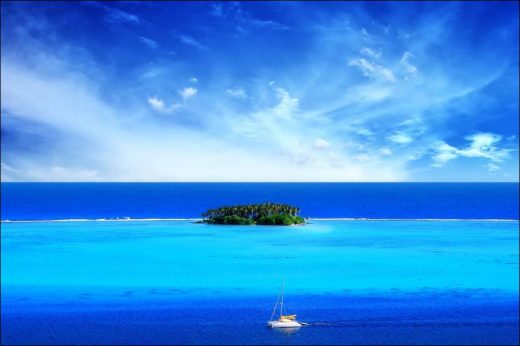We notice many changes happening on land. Trees are cut down, plants disappear, precipitation changes. Now the seasons are different. Many of us are experiencing these changes. So what changes underwater? Maybe we don’t see it, but doesn’t it affect us? Atlantic Ocean, Arctic, Indian Ocean…. Do you think that the changes that are happening there do not affect us?
The point farthest from land in the ocean is called Nemo Point. It is named after Captain Nemo, the hero of Jules Verne’s 20,000 Leagues Under the Sea. If you think that we are also Nemo points according to the oceans and that every change in the ocean does not reflect on us, you are very wrong.
Oceans make up 71% of our planet. And it offers many benefits to humanity, from mitigating extreme weather conditions, to producing the food we eat, to medicines for a disease that is our nightmare, from storing the excess carbon dioxide we produce to oxygen that sustains our life. It would be right to add the tranquility of the mysterious and magnificent nature of the underwater to these benefits.
Many of us are not yet aware that we are experiencing climate change. That’s because the extra heat held by greenhouse gases is transferred to the ocean. When we burn fossil fuels (oil, gas, coal) carbon dioxide goes into the atmosphere. Carbon dioxide has the property of retaining heat. The more it is in the atmosphere, the more heat is retained on earth. What we don’t know is that 93 percent of the retained heat returns to the ocean. This ratio means a lot of energy. If the oceans did not retain heat; The average temperature of our planet would be 50 degrees.
The effects of increased greenhouse gas emissions threaten coastal and marine ecosystems through changes in ocean temperature and melting ice, which in turn affects ocean currents, weather patterns and sea level. And as the ocean’s carbon sink capacity is exceeded, we’re seeing the ocean’s chemistry change as well because of our carbon emissions. In fact, humanity has increased the acidity of our ocean by 30% in the last two centuries. In 90 years, we won’t be able to touch it because the ocean water has become acidic.
These conditions are killing coral reefs. The death of coral reefs means the tragic loss of 25% of the marine life in the ocean. A coral reef can die in just 4 months. 10% of the reefs are now gone. It is said that if we do not take action, all reefs will disappear by 2050. Will we live as we know it, without them? Blue algae provide 70% of the world’s oxygen. A 1 degree change in the pH of the ocean means the extinction of all living species in the world.
Apart from greenhouse gases, another problem is that the oceans turn into plastic garbage. At least 14 million tons of plastic particles less than 5 mm in diameter lie at the bottom of the oceans. Large plastic litter just circulates, while micro-plastic litter is consumed by a wide variety of animals, from plankton to whales. The garbage heaps we create create dead spaces the size of continents.
As long as we continue to emit greenhouse gases and continue to have microplastic garbage in the oceans, we are killing the oceans. So we are killing the human species. Climate change is only caused by the thoughtless, selfish behavior of the human species. Other creatures have no contribution to this situation, but they become victims of the chaos we have created. On our planet, where we live with 10 million living species, every 20 minutes a living species disappears.
In this order, we produce 33 billion tons of carbon dioxide per year. So we destroy the things we need to live. For example, everything we call food happens thanks to photosynthesis created by sunlight. Thanks to the interaction of the sun’s rays with many other things, we can sustain our life. We live in an interconnected system. However, it is understood from the table in the middle; We cannot look after this system, we cannot own it.
We do not have the luxury of keeping the Paris Agreement out of our agenda, not being a Science Based Targets signatory, not taking action. We are facing a climate crisis, not climate change. Since people do not learn what life is and lose their knowledge of life, disasters continue to be with us, and they will continue to be. Man must begin to use his inherent selfishness for the continuation of his own kind.
The blue heart of the world, we have no shores to the oceans, but they are not far from us. Everything on our planet is interconnected. Out of sight is not out of our lives either.
Visits: 60



